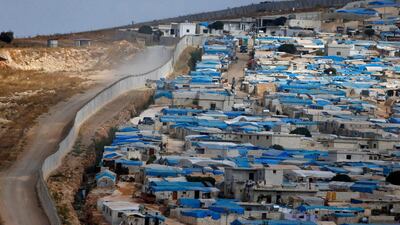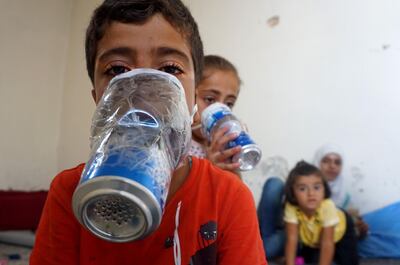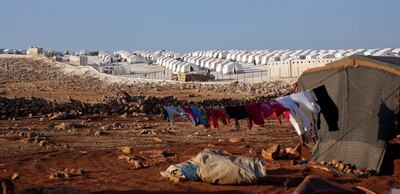In the arid expanses of Idlib in northwestern Syria, a sea of tented settlements was once an unusual sight. This province, just kilometres from the Turkish border, has now become a repository for some of Syria’s most vulnerable people, who have fled raging violence across the country.
Half of Idlib's current population of 2.5 million have been displaced multiple times, escaping successive waves of violence. With no options to move on or to return to their homes, many of the displaced feel stranded. Amid growing fears of a brutal offensive on the province, their survival seems to be stacked against all odds.
One of these tents has served as a makeshift home for Hassoun, who has spent the past eight months in a 10 metre-squared space with several family members and, at times, complete strangers. Having travelled hundreds of kilometres with his family, carrying only the bare essentials, privacy is a luxury overshadowed by the daily toils of life in displacement.
From securing clean water and surviving on minimal power to preventing snakes and scorpions from entering the tent, his immediate needs are spartan at best. Making a living and securing an education for his children are more ambitious goals.
Returning to his home is a distant thought. While demonstrating remarkable determination to improve the conditions around him, Hassoun also feels the weight of losing all that he built for his family in their home town.
He is just one of hundreds of thousands of internally displaced persons (IDPs) in Idlib, who are stranded between survival and the risk of a new displacement. Amid shrinking safety and meagre resources, they occasionally receive cross-border assistance from Turkey.
But Idlib – designated a de-escalation zone in Astana in May 2017 – is far from an ideal place of refuge. The repercussions of a full-scale assault will be staggering. Families like Hassoun's, who risk being surrounded with few routes to safety, will feel the full wrath of fighting. All other so-called de-escalation zones in Syria, among them Eastern Ghouta, have been re-taken by government forces. Idlib is the last one standing.
This is yet another grim prognosis in a series of zero sum battles that have transpired over the past three years while the Norwegian Refugee Council has been continuing its humanitarian relief effort in Syria, in places like Aleppo, Eastern Ghouta and, more recently, southern Syria. Moments of hope have been few and far between.
An all-out offensive on Idlib could wreak devastation on a greater scale than witnessed before, with fiercer intensity and further long-term instability in Syria. The displacement from an offensive would significantly surpass others in recent memory, from the 158,000 forced to flee Eastern Ghouta to the 330,000 displaced from southern Syria within two weeks.
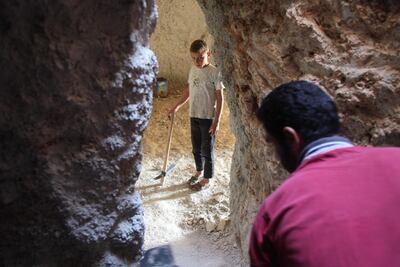
The repercussions will be felt across borders. The latest reactions of external actors with vested interests, especially Turkey, reveal these concerns. Both Turkey and Russia have admitted that battles in Idlib will put millions of civilians at risk.
Tens of thousands of families are currently wholly reliant on aid. Entire camps are operating off the grid, without access to clean water or sanitation. The conditions in IDP camps are already ripe for a man-made health disaster. The population density in northern areas would amplify any contagious diseases. Further displacement within Idlib would significantly increase these risks. Based on current projections, adding up to a million people to already congested border regions would escalate the aid constraints to insurmountable levels.
The only way to ensure the safety of civilians in Idlib and surrounding areas and stabilise the region is to prevent an offensive altogether. The countries engaged in the conflict must choose peaceful negotiations and world powers must steer agreements that prioritise the protection of civilians.
As a main backer of Idlib as a de-escalation zone – which was also agreed upon by Turkey and Iran –Russia has acknowledged the importance of maintaining the Astana-brokered status quo. It must continue to exert diplomatic pressure on its allies and rivals, while helping maintain cross-border access for humanitarian relief, as guaranteed by UN Security Council Resolution 2165. This access will be critical in addressing the overwhelming needs of people fleeing in the event of an offensive.
Turkey played a pivotal role last year in renewing the UN resolution and must continue as a vanguard, as it is faced with a potential new exodus of displaced Syrians fleeing towards its borders. It is in the country´s interest to help prevent an offensive and to provide humanitarian agencies with access to the swathes of territory under its control, filled with vulnerable civilians.
While we await progress with these negotiations, humanitarian agencies must prepare for a worst case scenario. To begin with, the capacity of local first responders that we work with must be strengthened. Emergency supplies must reach the locations prior to an offensive, lest they become inaccessible. Finally, we must be realistic about how many people might be affected and address the looming gap in providing shelter.
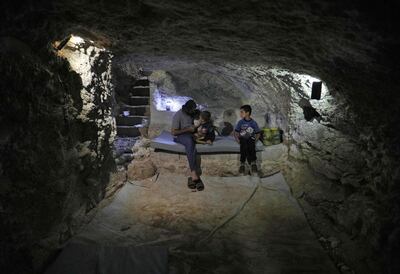
The humanitarian response system has failed to reach far too many civilians in some of the worst moments of this war. This time our efforts ought to be proactive rather than reactive in order to ameliorate the scale and impact of displacement. In order to be effective, we need unimpeded access.
In Syria, the biggest challenge for non-governmental organisations has been carving out a space to carry out our operations. NGOs have been denied access by authorities from all sides, to some of the most vulnerable people trapped in the conflict. Shelling, sniper fire and airstrikes in areas housing large populations have also made aid delivery near impossible.
Aid agencies themselves have been caught in the crossfire while providing lifesaving assistance to trapped civilians. Ultimately, Syrian civilians have paid dearly for the lack of humanity from all sides of the conflict and the general disregard for principles of international humanitarian law.
The current deliberations over Idlib present an opportunity for all stakeholders to step back from a violent confrontation and prioritise humanity and stability over geopolitics. Otherwise our worst fears could be realised and the high population density will undeniably lead to high casualties.
Thomas White is the country director in the Syria Response Office for the Norwegian Refugee Council
